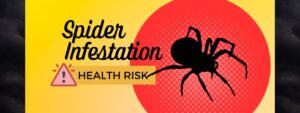 When you find an eight-legged visitor in your home, the first reaction is usually one of alarm. It's not just the creepy-crawly nature of these creatures that causes concern, but also the potential health risks they might bring. While spiders are generally beneficial in controlling other insect populations, an infestation can be a different story altogether.
For homeowners, knowing the risks associated with these arachnids is essential. This blog will explore the health risks posed by spider infestations, the signs to look out for, and how to handle the situation effectively. By the end, you'll have a comprehensive understanding of the topic and practical tips to keep your home safe.
When you find an eight-legged visitor in your home, the first reaction is usually one of alarm. It's not just the creepy-crawly nature of these creatures that causes concern, but also the potential health risks they might bring. While spiders are generally beneficial in controlling other insect populations, an infestation can be a different story altogether.
For homeowners, knowing the risks associated with these arachnids is essential. This blog will explore the health risks posed by spider infestations, the signs to look out for, and how to handle the situation effectively. By the end, you'll have a comprehensive understanding of the topic and practical tips to keep your home safe.
Health Risks Posed by Spider Infestations
One of the primary concerns about spider infestations is the potential health risks they bring. While most species are harmless, some can cause significant problems. Let's focus on a few key areas where infestations can impact human health. First and foremost, spider bites can range from mild to severe. While many species have venom that is not harmful to humans, others can cause more serious reactions. For instance, the bites from brown recluse and black widow spiders are medically significant. These bites can lead to symptoms such as pain, swelling, and even necrosis in severe cases. Most people will experience mild reactions, but those with allergies may face more intense symptoms. Allergic reactions are another health risk. Some people are sensitive to spider bites and may develop severe reactions, including difficulty breathing and anaphylaxis. It's crucial to know the symptoms and seek medical attention if you suspect a serious reaction. Secondary infections can occur due to scratching or improper treatment of spider bites. When a bite becomes infected, it can lead to more severe health issues. Maintaining clean and proper wound care is essential to prevent complications. Additionally, infestations can create an environment conducive to other pests. Spiders feed on other insects, and a high population might indicate a broader pest problem. This situation can lead to increased health risks from other pests, such as mosquitoes or cockroaches, which are known carriers of diseases. It's important not to overlook the psychological impact of spider infestations. Arachnophobia, or the fear of spiders, is one of the most common phobias. An infestation can cause significant stress and anxiety, affecting the mental well-being of homeowners. The constant worry about encountering spiders can lead to sleep disturbances and heightened stress levels. Understanding these health risks can help homeowners take appropriate action to manage spider infestations effectively. Now, let's explore the signs of an infestation and how to address it.Identifying Signs of a Spider Infestation
Recognizing the signs of a spider infestation early on can help you take timely action. The most obvious sign of an infestation is seeing more spiders than usual. While occasional sightings are normal, frequent encounters indicate a larger problem. Pay attention to the areas where you spot them, as this can help identify potential entry points and hiding spots. Discovering numerous webs and egg sacs is another clear sign of an infestation. Different species create various types of webs, so it's helpful to familiarize yourself with the common ones in your area. Removing webs and egg sacs can help control the population, but it's essential to address the root cause to prevent recurrence. Spiders feed on other insects, so finding an unusually high number of insect carcasses can be a sign of their presence. If you notice dead insects around your home, it might indicate a thriving spider population. This is particularly common in basements, attics, and other secluded areas where insects gather. By being vigilant and recognizing these signs, you can take proactive measures to manage spider infestations. Next, let's discuss effective strategies to handle infestations and protect your home.Effective Strategies for Managing Spider Infestations
 Dealing with a spider infestation requires a combination of preventive measures and active intervention. Maintaining a clean and clutter-free home is one of the best ways to prevent infestations. Spiders are attracted to dark, undisturbed areas, so regular cleaning and decluttering can make your home less inviting. Pay special attention to basements, attics, and storage areas where spiders are more likely to hide.
Preventing spiders from entering your home is crucial. Inspect your home for potential entry points, such as cracks, gaps, and openings around windows and doors. Sealing these entry points can significantly reduce the chances of an infestation. Using weather stripping and caulking can be effective in blocking their access. Additionally, keeping outdoor lights off or using yellow bulbs can reduce the attraction of insects, which in turn, reduces the food source for spiders.
Implementing these strategies can help you manage and prevent spider infestations effectively. However, in some cases, professional intervention may be necessary. Let's explore why Truly Nolen is the best choice for pest control.
Dealing with a spider infestation requires a combination of preventive measures and active intervention. Maintaining a clean and clutter-free home is one of the best ways to prevent infestations. Spiders are attracted to dark, undisturbed areas, so regular cleaning and decluttering can make your home less inviting. Pay special attention to basements, attics, and storage areas where spiders are more likely to hide.
Preventing spiders from entering your home is crucial. Inspect your home for potential entry points, such as cracks, gaps, and openings around windows and doors. Sealing these entry points can significantly reduce the chances of an infestation. Using weather stripping and caulking can be effective in blocking their access. Additionally, keeping outdoor lights off or using yellow bulbs can reduce the attraction of insects, which in turn, reduces the food source for spiders.
Implementing these strategies can help you manage and prevent spider infestations effectively. However, in some cases, professional intervention may be necessary. Let's explore why Truly Nolen is the best choice for pest control.

